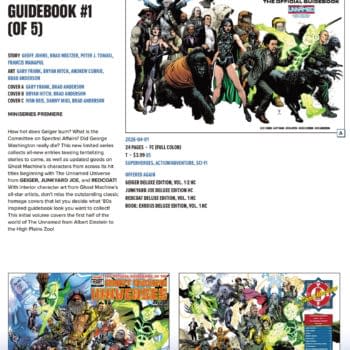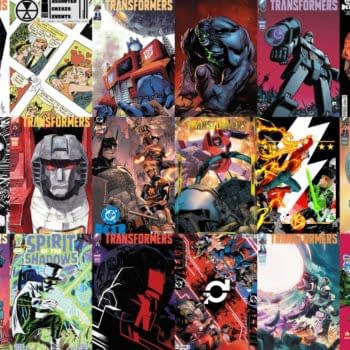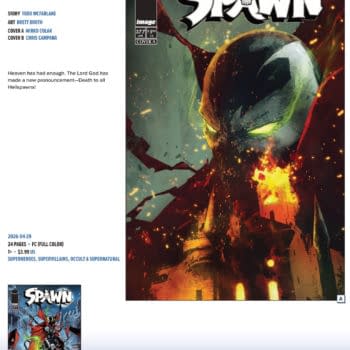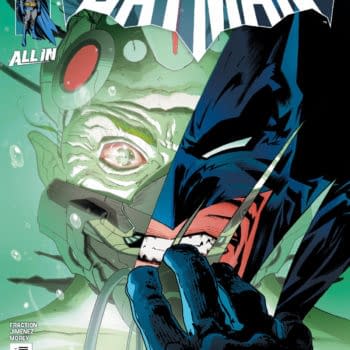Posted in: Comics, Recent Updates | Tagged: art comics, Henni, indie Comics, Miss Lasko Gross, z2 comics
The Unintentional Rebel – Miss Lasko-Gross Discusses New Graphic Novel Henni, Plus Process Art
Henni, a new graphic novel from Miss Lasko-Gross (Escape From Special, A Mess of Everything) arrives in shops this January via Z2 Comics. For those who follow the indie and arts comics world, it's been no secret that Lasko-Gross has been working on her anticipated new book for some time, and also that it would be quite a departure from her previous semi-autobiographical comics in that it would break into an anthropomorphized world where society and social customs were held up to close scrutiny. And yet this book also fits within the adventure genre and has many of the classic elements of a "journey" story where a character leaves the safe, albeit restrictive, confines of home to discover what the wider world may hold.

Miss Lasko-Gross talks with us here at Bleeding Cool about how and why Henni came about, what conformity and non-conformity in the world means to her, and gives us insight into the graphic novel's young adventurer and what's in store for her on what is, oftentimes, a painful journey of discovery.

Miss Lasko-Gross: There's a tendency, on the part of teachers and peers to assume that the ideal person should be well-rounded* (*In this context: competent at most things and above average at a few) but, like a lot of creative types, mine is a jaggedly unbalanced skill set. I was a strong writer and artist but also a delayed Special Ed student, HORRENDOUS at sports and socially weird. People like that are always under pressure to fit a mold instead of being allowed to grow in their own direction. The pressure is actually well meaning, to "save"oddballs from becoming lifelong failures.
Internalizing that pressure, measuring yourself against an imaginary normal, and feeling your deviations from mediocrity as faults, is a road to suffering. Being confident enough to realize you aren't aiming for the conventional targets makes it a moot point.
In my new graphic novel, when Henni and her younger sister were still children, their father was "neutralized" for his radical antiestablishment practices. In the ensuing years, mother (a true believer) raised the girls to be unquestioning and obedient. Henni is NOT an intentional rebel. She understands her desire for the forbidden needs suppressing but SHE CANNOT RESIST.
There ARE a sizable percentage of people (like Henni's Mother, sister and friends) who actually thrive under societal constraint. For whom a clear set of rules (religious/social) makes the universe feel like an ordered and safe place. I do NOT believe their compliance makes them stupid or weak. In a way it's the default for humanity, as group cohesion plays a massive role in our own progress as a species.

MLG: The snob in me enjoys"high"art (that which requires decoding of symbolism and historical context to fully appreciate), but I've always found comics more immediate and sexier. Tank Girl, Love and Rockets, Akira and Fantastic 4 were friends to dorky young me in a way that no beautiful but remote canvas could be.
Even at their most pretentious, comics are still entertaining and meant to be understood by all readers. For as non-condescending as they are on the surface, in no other medium does the opportunity to manipulate visual/text, said/unsaid, shown/unseen offer such a deeply complex playground.
This is a great time to be making art comics, as there is an amazing network of well- curated independent comic shops showcasing the kinds of books I love to read and create.

MLG: What I feared would happen is that I'd have no time to draw, and lose my artistic soul to mommy-hood. What I didn't anticipate was the manic time management chops parents develop out of necessity. You run through plot points while you're packing a lunch, you ink a page while doing a half-assed job of supervising some finger painting. I accept that I must occasionally photoshop greasy little fingerprints from my pages, but it gets done. The path is circuitous and streaked with boogers, but the work turns out just as it would, and possibly more thoughtful for being so hard won.
HMS: Has creating Henni been a long process? Can you tell us a little bit about the development of the story in your own mind as well as the artwork?
MLG: Henni began over 4 years ago as a serialized story for the House Of Twelve Comixology app. At the time I was about 50 pages into drawing a new non-fiction GN. It was really heavy and dark material. I started Henni as a throwaway side project that would be a fun and light counterbalance to the weight of the other (Also after two autobiographical GNs, I can't overstate how sick I was of drawing my own stupid face).
As Henni progressed, I found myself enjoying that more and more, until finally I opted to scrap the other book and focus on Henni completely. Comics are so time-intensive that it only makes sense to work on what you're passionate about.
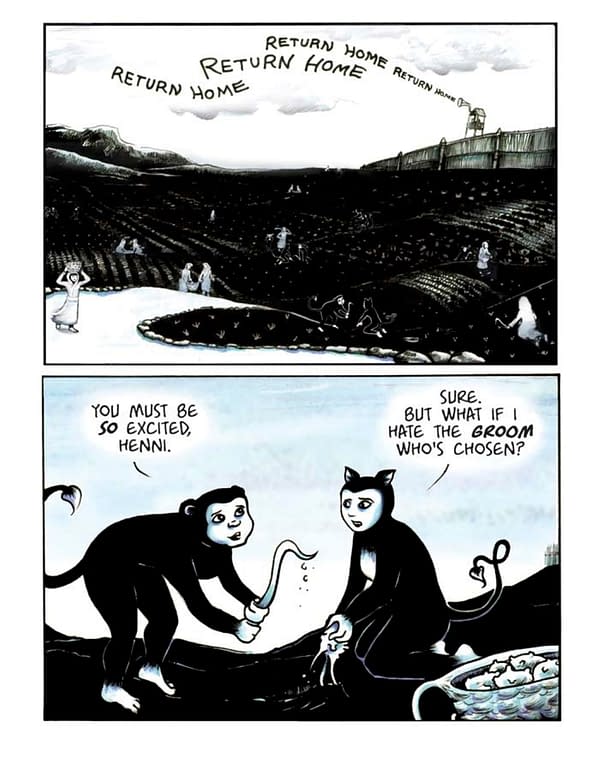
MLG: In the process of Henni becoming my main project, she changed from a small woodland creature to more of an anthropomorphic cat person. I think the beauty of telling a story without humans is that it frees you up to make social commentary (particularly on the dangers of fundamentalist thinking), without people feeling like any one group is being singled out for ridicule. When it's clearly not our world, you can explore things thematically (gender/race/class) without oversensitive readers feeling personally attacked. In the end, this is definitely an adventure story NOT an attempt to teach people what they already know.
HMS: When you wanted to convey different types of belief systems, did you find it challenging to simplify elements that everyone could recognize features from their own experience, and yet mention things that would fit well with the story?
MLG: A lot of my research and preparation for Henni involved creating plausible societal backdrops. Every group is a mash up of actual human belief systems (The feudalism of medieval Europe married to the Indian caste system with African nomadic traditions…). I tried to establish them in a way that felt organic and familiar, yet not distractingly specific to a particular real world culture.

MLG: There's a spectrum. In our culture, not at all. No matter how "transgressive," we have the framework to debate its value. We're hopelessly spoiled that way. Of course, elsewhere on the globe merely attaching the name of a prophet to ANY picture can carry a death sentence. Between the extremes are places where art endangers only the traditional order. Asking uncomfortable questions: Does God exist? Is our government just? Why are women worth less in our culture? Are we really justified in killing our enemies? So it just matters where you're standing.
HMS: Henni's home village is radically structured and controlling. Can you tell us more about that world? Why do you think the beings there choose to live within such structures?
MLG: Just as in our world people tend to view the culture in which they're raised as normal and judge others by how they differ from that "norm", in Henni's world the only choice appears to be obedience or death. Even those who may secretly harbor doubts about their strict faith are held in stasis by fear of losing everyone and everything they know. In our world similar forces bind people within orthodox communities. There's good documentation that people who walk away from their Amish, FLDS or Hasidic background often feel that losing their whole world was the price of their freedom. It's fear of that trauma, as opposed to threats of force, holding many otherwise independent thinkers in line.
HMS: What do you think Henni is up against? What traits do you think work in her favor to help her on her way?
MLG: She faces the deadly social roadblocks people construct to shelter themselves from the chaotic indifference of the universe and their own fear of mortality. From an early age, Henni learned to keep her head down and her eyes open, knowing when to fight and when to run. Not being a hero has served her well. Loyalty, compassion and occasional bravery keep her life dangerous.
HMS: Can you tell us a little bit about your plans for a sequel to Henni?
MLG: I'm currently at work on Book 2. Henni encounters, for the first time, members of the race that controls her world as well as THEIR arch-enemies the weird and secretive Romance Army. She also finds an unlikely ally to share her travels with.
********************************************
Miss Lasko-Gross has kindly shared some images with us to show the visual evolution of Henni as a character from her first character designs, to her app version, to her appearance in the graphic novel.
Lasko-Gross also explains that the character design for Henni is: "Strong and healthy, plausible for a field worker. Cute but animalistic not twee. The three fingers and toes are meant to be of a definitively different evolutionary path than our own".
Here are the first sketches of Henni:













